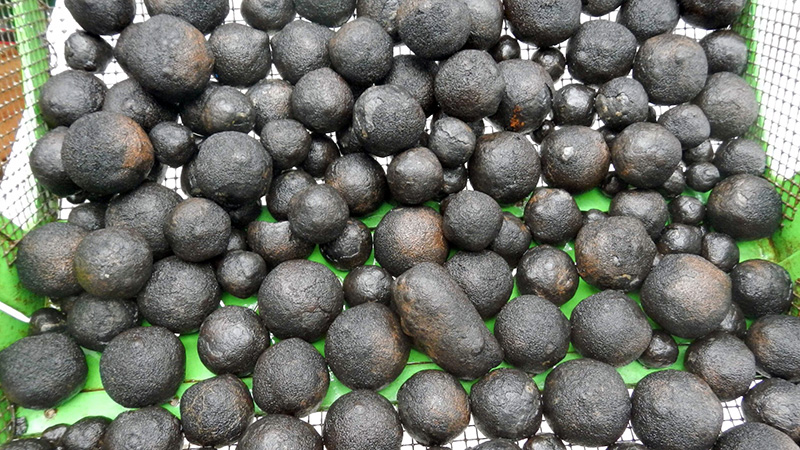Questions on seabed exploration applications
Saturday 20 November 2021 | Written by Te Ipukarea Society | Published in Opinion

Three companies have applied for exploration licences to explore the Cook Islands seabed for these nodules. SBMA/ 21111925
For those of us who wish to dive a little deeper into the seabed exploration applications looking for answers to some obvious questions, it appears this will not be possible. We are currently not able to access the entire application from each company, for reasons of commercial sensitivity.
Already we are halfway through the submission period for seabed exploration licencing in Cook Islands waters. You have until 12pm Friday, December 3 to submit your thoughts to the Seabed Minerals Authority (SBMA). Helpfully a submission template is also available on the SBMA website.
So where to begin? Here are a few points to bear in mind when you review the information.
First, is the risk of legal challenge. This is one of our main concerns. If a company is awarded an exploration licence, how confident are we that the Cook Islands can protect itself from threat of legal challenge, if this exploration licence does not result eventually in a full mining licence.
That is, what happens if, after these companies invest large amounts of money in exploration and conduct a mining environmental impact assessment (EIA), they find their applications are denied? Will those companies be happy to walk away, or will they be able to sue the Cook Islands for not issuing a licence to mine (harvest, extract, gather or whatever word is used). We understand that one of the companies applying a Cook Islands exploration licence is closely related to another company now involved in such a law suit.
Secondly, what is the required amount of environmental data to be gathered during this exploration stage and is it comprehensive enough to secure a baseline of species that may be impacted before mining can go ahead?
The Metals Company (not one of our applicants) holds licences in joint ventures with Kiribati, Tonga and Nauru for nodule exploration in the Clarion Clipperton zone (CCZ). With over a decade of experience in exploration of the deep sea, they have recently publicly acknowledged the deep sea is a difficult environment to secure environmental data:
“Given the significant volume of deep water and the difficulty of sampling or retrieving biological specimens in the Area, a complete biological inventory might never be established. Accordingly, impacts on CCZ biodiversity may never be, completely and definitively known.”
With this in mind, how confident are we of securing comprehensive environmental baseline data in the Cook Islands?
For those of us who wish to dive a little deeper into the applications looking for answers to these questions, it appears this will not be possible. We are currently not able to access the entire application from each company, for reasons of commercial sensitivity.
Yet in the case of the Trans-Tasman Resources application for a seabed mining licence in New Zealand, the Environment Court found that full information can, and should be made available to the public to enable informed perspectives to contribute to decision making. If there are any truly commercially sensitive parts, they can be obscured from the text.
We would like the opportunity to review and seek independent technical, scientific and legal advice on those full applications, so that we can prepare a submission that is both thorough and useful. Together with adequate time to do so.
Finally, for genuine transparency, we hope all submissions from the public will be be made available to the public and any comments made by mining companies in response to those submissions should also be made public.
As stewards of our little paradise here in the middle of the Moana nui o Kiva, we should perhaps be mindful of this verse from the Bible, “And I brought you into a plentiful land to enjoy its fruits and its good things. But when you came in, you defiled my land and made my heritage an abomination.” (Jeremiah 2:7)
(References are available on request to Te Ipukarea Society)














































